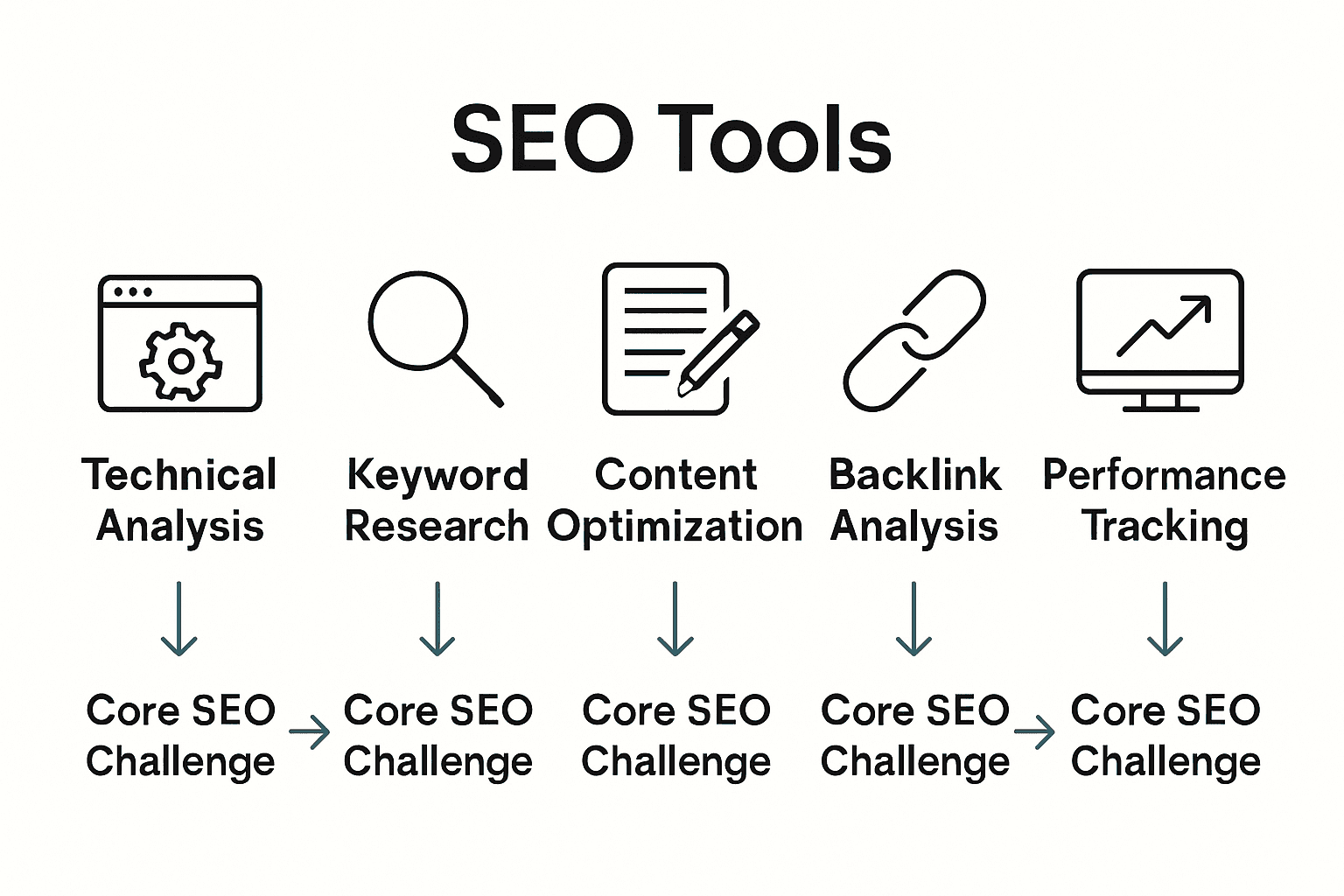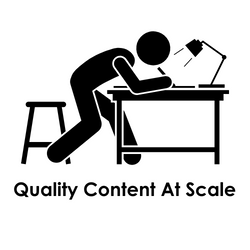Over 75 percent of users never scroll past the first page of search results, highlighting just how fierce online competition has become. If you want your website to stand out, simply creating good content is no longer enough. This article breaks down how specialized SEO tools help businesses and creators unlock hidden opportunities, improve visibility, and transform overwhelming data into clear steps for growth.
Key Takeaways
| Point | Details |
|---|---|
| Importance of SEO Tools | SEO tools streamline digital marketing efforts by automating critical tasks and providing comprehensive insights, allowing professionals to focus on strategic decision-making. |
| Diverse Tool Categories | Various SEO tool types—technical analysis, keyword research, content optimization, backlink analysis, and performance tracking—address different aspects of SEO for a holistic improvement. |
| Cross-Functional Benefits | Digital professionals, from marketers to small business owners, leverage SEO tools to enhance online visibility, compete effectively, and make data-driven decisions. |
| Continuous Adaptation | Successful SEO requires ongoing optimization and learning to stay aligned with evolving search algorithms and overcome common pitfalls in strategy execution. |
Table of Contents
- Defining SEO Tools And Their Importance
- Main Types Of SEO Tools Explained
- How SEO Tools Improve Website Rankings
- Benefits For Marketers, Bloggers, And Owners
- Common Pitfalls And Mistakes To Avoid
Defining SEO Tools and Their Importance
SEO tools are digital powerhouses designed to help website owners, marketers, and content creators optimize their online presence and improve search engine rankings. Search engine optimization (SEO) tools transform complex digital marketing challenges into manageable, strategic processes by automating critical research and analysis tasks.
According to Search Engine Journal, these tools provide significant advantages by automating critical processes such as:
- Website audits
- Competitor research
- Link building analysis
- Content performance tracking
- Comprehensive reporting
The real magic of SEO tools lies in their ability to save time and reduce manual work while delivering more accurate results. Instead of spending hours manually checking website metrics or analyzing competitor strategies, professionals can leverage these tools to quickly generate insights that would traditionally require days of intensive research. This automation allows teams to shift their focus from repetitive tasks to high-level strategic optimization and creative problem solving.
Moreover, SEO tools democratize digital marketing intelligence. Whether you’re a solo blogger, small business owner, or part of a large marketing team, these platforms provide access to advanced analytics and competitive insights that were once available only to large corporations with extensive resources. By breaking down complex SEO processes into user-friendly interfaces and actionable recommendations, these tools help businesses of all sizes compete effectively in the increasingly crowded digital landscape.

Main Types of SEO Tools Explained
SEO tools are not a one-size-fits-all solution but a diverse ecosystem of specialized platforms designed to tackle different aspects of digital marketing optimization. According to TIS Consulting, a comprehensive SEO strategy requires a full-stack approach that combines multiple tool categories to effectively enhance online visibility.
Key SEO Tool Categories
The primary types of SEO tools include:
- Technical Analysis Tools: Like Screaming Frog, which perform deep site crawling and identify technical issues that could impact search rankings
- Keyword Research Tools: Such as Semrush, offering comprehensive competitor analysis and keyword discovery
- Content Optimization Platforms: Including Surfer SEO, which provide data-driven content optimization strategies
- Backlink Analysis Tools: Exemplified by Ahrefs, specializing in comprehensive link profile examination
- Performance Tracking Tools: Like Google Analytics and Google Search Console, which monitor user behavior and website indexing
Each tool category serves a unique purpose in the SEO ecosystem. Technical analysis tools uncover website structural problems, keyword research tools help identify valuable search terms, content optimization platforms enhance writing quality, backlink analysis tools assess domain authority, and performance tracking tools measure actual impact and user engagement.
Here’s a comparison of primary SEO tool categories and their core functions:

| Tool Category | Main Purpose | Notable Examples |
|---|---|---|
| Technical Analysis | Find site issues Site crawling | Screaming Frog |
| Keyword Research | Discover search terms Competitor keywords | Semrush |
| Content Optimization | Content improvement On-page SEO | Surfer SEO |
| Backlink Analysis | Analyze link profile Assess authority | Ahrefs |
| Performance Tracking | Monitor site traffic SEO KPIs | Google Analytics Google Search Console |
The real power emerges when these tools are strategically combined. By integrating insights from different platforms, digital marketers can develop a holistic approach that addresses technical performance, content quality, competitive positioning, and measurable results. This multi-dimensional strategy transforms SEO from a guessing game into a precise, data-driven marketing discipline.
How SEO Tools Improve Website Rankings
Search engine optimization (SEO) tools play a critical role in transforming websites from invisible online entities to prominent search result contenders. According to Semrush, these sophisticated platforms provide strategic advantages that directly impact search engine rankings through multiple targeted approaches.
Keyword and Content Optimization Strategies
One of the most powerful ranking improvements comes from strategic keyword research. SEO tools enable website owners to:
- Identify low-competition keywords with higher ranking potential
- Discover content gaps in existing website strategies
- Analyze competitor keyword performance
- Target featured snippet opportunities
- Develop content that precisely matches user search intent
According to Search Engine Journal, successful ranking improvements also depend on implementing advanced optimization techniques. These include creating E-E-A-T (Experience, Expertise, Authoritativeness, Trustworthiness) content, utilizing structured data schema markup, and ensuring mobile-first indexing compatibility.
The most significant ranking boost comes from a holistic approach that combines technical optimization with high-quality content strategy. SEO tools help websites build authoritative backlink profiles, maintain content freshness, and continuously adapt to evolving search engine algorithms. By providing data-driven insights and actionable recommendations, these tools transform random content creation into a precise, strategic marketing approach that search engines reward with higher visibility and improved rankings.
Benefits for Marketers, Bloggers, and Owners
Digital professionals across various domains find SEO tools transformative, offering unique advantages that streamline complex marketing processes and drive strategic decision-making. These powerful platforms provide more than just data—they offer actionable insights that can dramatically improve online performance and visibility.
According to Search Engine Journal, SEO tools deliver critical benefits by enabling professionals to:
- Track progress through comprehensive SEO key performance indicators (KPIs)
- Generate visually compelling data dashboards
- Create strategic reports for clients and stakeholders
- Demonstrate clear return on investment (ROI)
- Align marketing strategies with measurable outcomes
Strategic Advantages for Different Professionals
For marketers, these tools act like a digital Swiss Army knife. Freelancers and agency professionals can quickly diagnose website issues, benchmark against competitors, and present sophisticated analytics that impress clients. Bloggers gain the ability to understand their audience better, identify content opportunities, and optimize their writing for maximum search visibility.
Small business owners and entrepreneurs particularly benefit from SEO tools’ democratization of complex marketing intelligence. Instead of requiring expensive consultants, these platforms provide affordable, user-friendly solutions that level the playing field. By offering insights previously accessible only to large corporations, SEO tools enable smaller entities to compete effectively, make data-driven decisions, and grow their online presence strategically and economically.
Common Pitfalls and Mistakes to Avoid
Navigating the complex world of SEO tools requires more than just access to sophisticated platforms—it demands a strategic and nuanced approach. Search engine optimization is fraught with potential missteps that can dramatically undermine your digital marketing efforts.
According to Search Engine Journal, some of the most critical mistakes professionals make include:
- Neglecting title tags and meta descriptions
- Failing to implement schema markup
- Overlooking quality link-building strategies
- Generating low-quality or irrelevant content
- Ignoring technical website performance issues
Technical Configuration Errors
Search Engine Land highlights additional technical pitfalls that can severely disrupt search engine performance. These include misconfigurations like:
- Improperly using robots.txt files
- Sending conflicting indexing signals
- Combining noindex and canonical tags incorrectly
- Relying on segmented or flawed analytics data
- Creating inconsistent URL structures
The most dangerous mistake is treating SEO as a one-time task rather than an ongoing process. Search algorithms continuously evolve, and what works today might become ineffective tomorrow. Successful digital marketers approach SEO as a dynamic, adaptive strategy—constantly learning, testing, and refining their approach based on the latest data and tool insights. By staying vigilant and understanding these common pitfalls, you can develop a more robust and resilient search optimization strategy that stands the test of time.
Ready to Finally Master SEO Tools and See Real Results?
If you feel overwhelmed by technical SEO challenges, confused by keyword research, or drained by hours of manual tracking, you are not alone. In the article, we explored how SEO tools can save time, turn complex problems into clear strategies, and empower marketers, bloggers, and business owners to gain a competitive edge. But finding the right step-by-step guidance and powerful resources is often the missing piece that stops you from reaching top search rankings.
Now is the perfect time to take action. Visit wordsatscale.com to access our Free 7-Day Advanced Keyword Research Academy and start using free SEO and blogging tools built for real growth. Spots are limited, so move quickly to unlock hands-on lessons, exclusive discounts, and a supportive community focused on boosting your ranking, traffic, and confidence. Turn what you learned into action—start your journey to higher rankings and smarter SEO today at wordsatscale.com.
Frequently Asked Questions
What are SEO tools and why are they important?
SEO tools are digital platforms that help website owners and marketers optimize their online presence. They automate critical processes such as website audits, competitor research, and content performance tracking, making digital marketing more efficient and manageable.
How can SEO tools improve my website’s rankings?
SEO tools improve website rankings by providing insights into keyword performance, content optimization, and technical issues. They help identify low-competition keywords, analyze competitors, and track site performance, enabling a data-driven approach to SEO.
What are the main types of SEO tools available?
The main types of SEO tools include technical analysis tools, keyword research tools, content optimization platforms, backlink analysis tools, and performance tracking tools. Each serves a unique purpose in enhancing a website’s visibility and search engine performance.
What mistakes should I avoid when using SEO tools?
Common mistakes to avoid include neglecting important SEO elements like title tags and meta descriptions, overlooking quality link-building strategies, and treating SEO as a one-time task rather than an ongoing process. Keeping your website updated and continuously optimizing is key to effective SEO.
